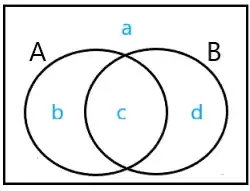Let $A,B$ be some events in probability space $\Omega$. Show that $$\mathbb{P}(A|B)+\mathbb{P}(A^c|B^c)=1$$ is false in general.
I thought of giving an example there events $A$ and $B$ are independent but then I get the correct equation because $$\mathbb{P}(A|B)+\mathbb{P}(A^c|B^c)=\frac{\mathbb{P}(A\cap B)}{\mathbb{P}(B)}+\frac{\mathbb{P}(A^c \cap B^c)}{\mathbb{P}(B^c)}=\mathbb{P}(A) + \mathbb{P}(A^c)=1.$$
My next idea was to check all other cases like when $A \subset B$ or when $A=B$ but everything seems to work out well. Can you help me of thinking of an example?
